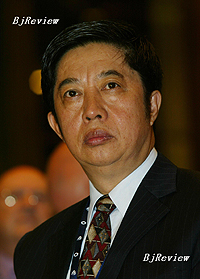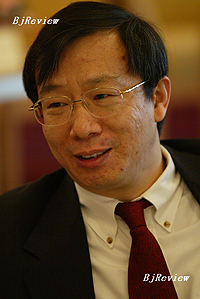|
 
The People's Bank of China (PBOC), the country's central bank, recently appointed two new vice governors. Ma Delun (left) and Yi Gang replaced Wu Xiaoling, who retired due to age, and Xiang Junbo, who was named president of the state-owned Agricultural Bank of China in June 2007. According to a statement released by the PBOC on January 8, the State Council, China's cabinet, approved the appointments on December 23, 2007.
The 59-year-old Ma has rich expertise in foreign currency regulation since working as deputy chief of the State Administration of Foreign Exchange in 2001-05, before he moved back to the PBOC headquarters as assistant governor. He had served the central bank for more than a decade between 1985-2001, from spokesman to department head of accounting.
Yi, 50, holds a Ph.D in economics and had worked in the monetary policy department in the central bank for six years before he was appointed as an assistant governor in 2004. Yi also is a past professor of economics at Peking University and assistant professor of economics at Indiana University in the United States.
The installment of the new central bankers has happened, though largely in coincidence, with an adjustment in China's monetary policy, which has deviated from the previous moderate tone.
A tighter monetary policy will help prevent the economy from overheating and curb broader price inflation, the central bank said in a news release issued after its annual meeting earlier this month.
"With more scholar-turned-officials joining the policy-making body of central level, China will see more operational currency policies to enhance the management in the area," said Zuo Xiaolei, chief economist with China Galaxy Securities Co. Ltd., indicating a high outside expectation on the new vice governors with strong academic background.
The PBOC is currently headed by Governor Zhou Xiaochuan. The three other incumbent vice governors are Su Ning, Hu Xiaolian and Liu Shiyu.
"The central bank's monetary policy will scarcely target asset prices, though it will keep a close watch on the stock and housing markets."
Ma Delun quoted in the China Securities Journal
"China's rising inflation, weak domestic demand, excess liquidity and massive trade surplus are its growing pains."
Yi Gang, showing resolution to fight against inflation and reverse negative interest rates
"Imitating foreign models blindly in medical reforms will only lead to mistakes."
Vice Minister of Health Gao Qiang, saying at a national conference that China's medical and health development will "follow a path with Chinese characteristics"
"Many people had to reduce their expenditures on other commodities to buy houses earlier than they originally planned."
Li Peilin, Director of the Sociology Institute under the Chinese Academy of Social Sciences, explaining that people's strong desire to buy their own houses in China has curbed consumption of other commodities and reduced consumption's share of the national gross domestic product to a 10-year low of 36 percent in 2007
"Among people who have knowledge of products from China, as a result of their profession, I think there is general acceptance that the overwhelming majority of the products are safe and of good quality and good value."
Richard O'Brien, Director of International Programs and Intergovernmental Affairs under the U.S. Consumer Product Safety Commission, at a press conference in Beijing on January 4
"If you improve the quality of life, but it doesn't show up in more material consumption, it doesn't show up in gross domestic product, and you'll be criticized."
Joseph Stiglitz, 2001 Nobel laureate in economic sciences, talking to Agence France-Presse in a phone interview. The U.S. economist has been named by French President Nicolas Sarkozy to head a panel to find a new method of economic calculation that will include quality-of-life factors
"A much sharper U.S. slowdown is a real risk that could weaken medium-term prospects in developing countries."
Uri Dadush, Director of the World Bank's Development Prospects Group and International Trade Department, speaking on January 8 while unveiling the development lender's annual report on global economic prospects | 